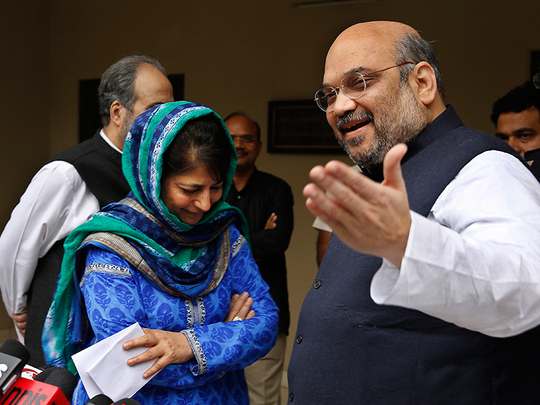
NEW DELHI: India’s ruling Bharatiya Janata Party (BJP) on Tuesday announced formation of a coalition government in Jammu and Kashmir with regional Peoples Democratic Party (PDP).
The two parties, with opposite ideologies, have been exploring through backdoor channels the option of coming together ever since the state elected a hung assembly on December 23 last year.
A formal announcement to this effect was made following a meeting between BJP president Amit Shah and his PDP counterpart Mehbooba Mufti in New Delhi Tuesday.
“We will form the government with PDP in Jammu and Kashmir, announced Shah while adding that details of the agenda of the alliance will be announced soon.
PDP founder Mufti Mohammad Sayeed is tipped to head the coalition government with BJP’s Nirmal Singh taking over as the deputy chief minister.
Sayeed, a former federal home minister, was chief minister of a coalition government for three years between 2002 and 2005. However, unlike in the past when the PDP and the Congress party shared the chief minister’s post for three years each, Sayeed would head the coalition government for its entire six years’ tenure.
“The alliance is not for power but to win people’s hearts,” Mehbooba Mufti said after her much-anticipated meeting with Shah.
Sayeed is expected to arrive in New Delhi on Wednesday and call on Prime Minister Narendra Modi to discuss various issues related to formation of the new government and to invite him for his swearing-in ceremony. Sources in the BJP indicated that Modi is expected to be present at the historic occasion considering it would be the first time ever his party would be part of the government in India’s only Muslim majority state. The new government is expected to be sworn-in on March 1.
PDP had emerged as the single largest party with 28 seats in the 87-member assembly while BJP finished a close second with 25 seats. PDP declined offers of support from the erstwhile ruling National Front and the Congress party which had won 15 and 12 seats respectively, terming the mandate as against the National Conference-Congress party which ruled the state for six years until Governor’s rule was imposed in the state on January 9 this year.
The two parties have already discussed in details the common minimum programme of the state government while BJP has agreed to the PDP demand that status quo would be maintained on two contentious issues — abrogation of Article 370 that gives Jammu and Kashmir constitutional status of a special state under the Union of India and withdrawal of AFSPA (Armed Forces Special Powers Act), which enables the army to arrest anyone without warrant.
Abrogation of Article 370, which BJP in the past termed as discriminatory in nature, was part of the BJP’s core issues since its formation. The two parties are believed to have agreed that AFSPA would not be withdrawn but state police and paramilitary forces would replace army from areas where security situation has improved over the years in a gradual manner without compromising national interests.












